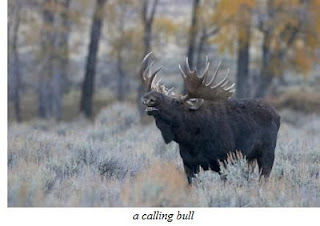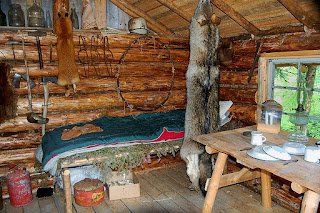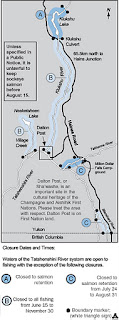Heard a moose

& shot a squirrel.
Found cabins belonged to Charlie Ross. Weather overcast but not cold. Left .22 at trail by Pringle Lake
We at a lot of squirrel back then. They're cheeky and bold, so you can get close enough to them that even a half decent marksman can bag one. Not a lot of meat on them, but it was protein. Not terribly tasty or tender either, but marinated in soy sauce, they tasted similar to teryaki. When you haven't had protein for a while, almost anything tastes good with enough soy sauce or garlic.
 Mitch skiied to Dalton Post on the home-made skis. They didn't hold up particularly well. I think he did more wading through hip-deep wet snow than skiing. I know the skis didn't come back with him. That was, to the best of my knowlege, his one and only attempt at making skis.
Mitch skiied to Dalton Post on the home-made skis. They didn't hold up particularly well. I think he did more wading through hip-deep wet snow than skiing. I know the skis didn't come back with him. That was, to the best of my knowlege, his one and only attempt at making skis. There's a kind of unwritten law in many wild places, that no door is kept locked, and the shelter of an uninhabited roof is free for anyone who needs it. If you're hungry, and you find food there, there's no shame in eating it. Just do your best to replace what you take. The same applies to firewood. If you need it, and it's  there, it's yours to use, but never use all of what you find unless you're right out of options. And always, unless you're mortally ill or terminally injured, replace the firewood you used, with dry, split wood for the next visitor. He or she may need it worse than you did. It's the frontier version of the 'Leave The World a Better Place Than You Found It' philosophy.
there, it's yours to use, but never use all of what you find unless you're right out of options. And always, unless you're mortally ill or terminally injured, replace the firewood you used, with dry, split wood for the next visitor. He or she may need it worse than you did. It's the frontier version of the 'Leave The World a Better Place Than You Found It' philosophy.
 there, it's yours to use, but never use all of what you find unless you're right out of options. And always, unless you're mortally ill or terminally injured, replace the firewood you used, with dry, split wood for the next visitor. He or she may need it worse than you did. It's the frontier version of the 'Leave The World a Better Place Than You Found It' philosophy.
there, it's yours to use, but never use all of what you find unless you're right out of options. And always, unless you're mortally ill or terminally injured, replace the firewood you used, with dry, split wood for the next visitor. He or she may need it worse than you did. It's the frontier version of the 'Leave The World a Better Place Than You Found It' philosophy. In the wilderness, especially in an extremely cold climate, it's hard to forget that your actions could mean the difference between life and death not only for yourself, but for a friend or a stranger, who comes there after you. This is true, not just about firewood or moose jerky for tomorrow or next week or month, but also or things that last for generations or more. Trappers often inherited their traplines from their parents or bought the rights to them from an old-timer. Some wanted to make a living there for a lifetime or more, so they were careful that there were always animals left to live off of. No one who knows he's going to need moose meat again next year kills all of the moose he can find this year. It's a philosophy we could use more of in places and situations further afield. Imagine businesses and countries harvesting minerals and trees and fish with a feeling of responsibility for the next people who came along and might need some?
There were cabins at Dalton Post, used by the fellow who trapped in the area. People who make their living trapping generally have any number of cabins along their traplines. They have to cover many, many miles, sometimes in the worst weather you can imagine. Back in the day, they traversed the miles on cross-country skis or snowshoes or, if they were lucky, by dogteam.... these days they're more likely to have a snowmobile with a heated seat and hand warmers in on the handlebars or in their mitts. A trapper who's really serious about his (or her) job can spend a week or more traveling the trapline, and never go to the same place twice. They build little cabins, spaced a day's journey apart, where they can build a fire, cook some hot food and sleep in a dry sleeping bag on a bed of sorts. Often the trapline trails are cut cross each other at the location of a cabin, so it can serve double duty.
 There's usually a tin airtight heater with a flip top lid in the middle of the single, low ceilinged room, and if it's really civilized, there'll be a table and a chair made of peeled poles and a chunk of plywood hauled in from somewhere. There may or may not be a window. The thing about windows is, they're the easiest place for a critter to get into. Bear and wolverine, squirrel and porcupine are really clever at finding ways inside something they know contains food. So if there is a window, it's probably also got heavy shutters that can be closed and fastened down when there's no one home. The bed might be a
There's usually a tin airtight heater with a flip top lid in the middle of the single, low ceilinged room, and if it's really civilized, there'll be a table and a chair made of peeled poles and a chunk of plywood hauled in from somewhere. There may or may not be a window. The thing about windows is, they're the easiest place for a critter to get into. Bear and wolverine, squirrel and porcupine are really clever at finding ways inside something they know contains food. So if there is a window, it's probably also got heavy shutters that can be closed and fastened down when there's no one home. The bed might be a  wooden pole frame with more peeled poles stretched across it, fastened to the wall on two sides in a corner, and propped on the one unsupported corner by a post. Spruce boughs often served as a mattress, cut fresh and replaced every week or so. The dried twigs and needles of the previous bedding made great kindling for the fire. A few nails in the walls served as clothes hangers and a pole hung by snare wire from the ceiling over the wood stove made a drying rack for mitts and socks crusted with snow.
wooden pole frame with more peeled poles stretched across it, fastened to the wall on two sides in a corner, and propped on the one unsupported corner by a post. Spruce boughs often served as a mattress, cut fresh and replaced every week or so. The dried twigs and needles of the previous bedding made great kindling for the fire. A few nails in the walls served as clothes hangers and a pole hung by snare wire from the ceiling over the wood stove made a drying rack for mitts and socks crusted with snow.There's often a spitoon. Almost every cabin had a rusty old coffee or lard tin half filled with disgustng brown slime. In a pinch it could also serve as a chamber pot.... not something I even want to try to imagine.... no matter how cold it is outside, I'll choose the outhouse over that every time, thank you very much. Chewing tobbacco is easier to manage than cigarettes when it's too cold to expose your face.  And there's the difficulty of lighting a match with mitts on, and making the sulphur ignite in very low temps . Exposed flesh freezes quicly in sub-zero temperatures. When you might be hours away from the next warm fire, you do your best not to get cold. So you chaw your 'baccy. In the winter, the nicotine dribbles formed along the side of your mouth freeze in your beard, till you have 2 brown icicles hanging down, one on each side of your mouth. It's easy to pick out the fellas who chew, even when these extremely attractive sludge colored icicles have melted away. The frozen tobacco juice bleaches the hair downward from the corners of their mouths, leaving blonde or orange or silver streaks. Fetching - most fetching... but doesn't hold a candle to being offered a kiss by a face covered in frost and dripping brown half-frozen slime.
And there's the difficulty of lighting a match with mitts on, and making the sulphur ignite in very low temps . Exposed flesh freezes quicly in sub-zero temperatures. When you might be hours away from the next warm fire, you do your best not to get cold. So you chaw your 'baccy. In the winter, the nicotine dribbles formed along the side of your mouth freeze in your beard, till you have 2 brown icicles hanging down, one on each side of your mouth. It's easy to pick out the fellas who chew, even when these extremely attractive sludge colored icicles have melted away. The frozen tobacco juice bleaches the hair downward from the corners of their mouths, leaving blonde or orange or silver streaks. Fetching - most fetching... but doesn't hold a candle to being offered a kiss by a face covered in frost and dripping brown half-frozen slime.
 And there's the difficulty of lighting a match with mitts on, and making the sulphur ignite in very low temps . Exposed flesh freezes quicly in sub-zero temperatures. When you might be hours away from the next warm fire, you do your best not to get cold. So you chaw your 'baccy. In the winter, the nicotine dribbles formed along the side of your mouth freeze in your beard, till you have 2 brown icicles hanging down, one on each side of your mouth. It's easy to pick out the fellas who chew, even when these extremely attractive sludge colored icicles have melted away. The frozen tobacco juice bleaches the hair downward from the corners of their mouths, leaving blonde or orange or silver streaks. Fetching - most fetching... but doesn't hold a candle to being offered a kiss by a face covered in frost and dripping brown half-frozen slime.
And there's the difficulty of lighting a match with mitts on, and making the sulphur ignite in very low temps . Exposed flesh freezes quicly in sub-zero temperatures. When you might be hours away from the next warm fire, you do your best not to get cold. So you chaw your 'baccy. In the winter, the nicotine dribbles formed along the side of your mouth freeze in your beard, till you have 2 brown icicles hanging down, one on each side of your mouth. It's easy to pick out the fellas who chew, even when these extremely attractive sludge colored icicles have melted away. The frozen tobacco juice bleaches the hair downward from the corners of their mouths, leaving blonde or orange or silver streaks. Fetching - most fetching... but doesn't hold a candle to being offered a kiss by a face covered in frost and dripping brown half-frozen slime.  This particular spot was operated by fellow who was more of a gold miner than a trapper. He annually forsook the 'civilized' life of Vancouver, from which his wife refused to budge, when the spring blossoms began to unfold, to spend his summers in the then untouched wilderness along the banks of the Klukshu and Tatshenshini Rivers. Yes, there was gold. Placer gold, washed down the rivers from some unknown source, which he patiently panned throughout the sommer. When it was all cleaned and weighed and cashed in , there was enough to pay for his 'vacation' and take some home to the little woman. His name was Charlie, and he was very proud of his sourdough bread.
This particular spot was operated by fellow who was more of a gold miner than a trapper. He annually forsook the 'civilized' life of Vancouver, from which his wife refused to budge, when the spring blossoms began to unfold, to spend his summers in the then untouched wilderness along the banks of the Klukshu and Tatshenshini Rivers. Yes, there was gold. Placer gold, washed down the rivers from some unknown source, which he patiently panned throughout the sommer. When it was all cleaned and weighed and cashed in , there was enough to pay for his 'vacation' and take some home to the little woman. His name was Charlie, and he was very proud of his sourdough bread. He told us he sent a loaf of it home to his wife in Vancouver one summer, as a treat.  The next time he went to the lodge for supplies he telephoned her to see how she'd liked it. She told him haughtily, "I threw the horrible stuff in the garbage." She wasn't so haughty when he told her he'd baked several ounces of gold in the middle of it as a surprise to her. It didn't seem to bother him much that she'd thrown the equivalent of a month's good wages out; he loved to tell the story, and he knew there was lots more gold where it had come from.
The next time he went to the lodge for supplies he telephoned her to see how she'd liked it. She told him haughtily, "I threw the horrible stuff in the garbage." She wasn't so haughty when he told her he'd baked several ounces of gold in the middle of it as a surprise to her. It didn't seem to bother him much that she'd thrown the equivalent of a month's good wages out; he loved to tell the story, and he knew there was lots more gold where it had come from.
 The next time he went to the lodge for supplies he telephoned her to see how she'd liked it. She told him haughtily, "I threw the horrible stuff in the garbage." She wasn't so haughty when he told her he'd baked several ounces of gold in the middle of it as a surprise to her. It didn't seem to bother him much that she'd thrown the equivalent of a month's good wages out; he loved to tell the story, and he knew there was lots more gold where it had come from.
The next time he went to the lodge for supplies he telephoned her to see how she'd liked it. She told him haughtily, "I threw the horrible stuff in the garbage." She wasn't so haughty when he told her he'd baked several ounces of gold in the middle of it as a surprise to her. It didn't seem to bother him much that she'd thrown the equivalent of a month's good wages out; he loved to tell the story, and he knew there was lots more gold where it had come from.


